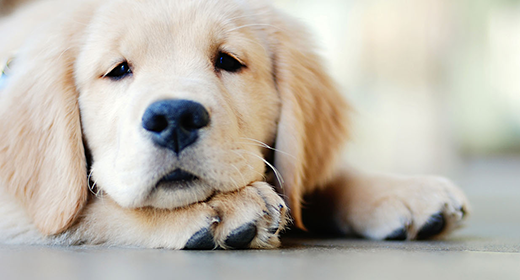

Diet plays a central role in your dog’s overall health and well-being, and it stands to reason that you want to provide your dog the best possible source of nutrition in the dog food you choose. But some nutrients, like L-Carnitine, may be unfamiliar or completely foreign. Learn more about this vitamin-like compound and how it can help your dog maintain a healthy weight.
Carnitine, or L-carnitine, is a vitamin-like compound made in the body from amino acids. It's found naturally only in animal-based protein sources. It has been used to help with fat metabolism in other species, and recent scientific studies show that it can help reduce weight in overweight dogs.
This water-soluble substance attaches to fatty acids, transporting them into cellular mitochondria, the part of the cell that converts fat into a usable form of energy. There, they are broken down through oxidation and converted to energy for all tissues, including the heart, liver, and skeletal muscles. Through this process, carnitine helps reduce the storage of body fat and the amount of fat in the bloodstream.
In a study conducted by The IAMS™ Company, overweight dogs were fed similar diets. One group was given a diet supplemented with L-carnitine while another group received a diet without supplemental L-carnitine.
After seven weeks, the group that received the diet without supplemental L-carnitine lost 1.8% body weight compared to 6.4% body weight loss from the group that was fed the L-carnitine supplemented diet. Likewise, body fat was reduced in each group by 2.4% and 4.6%, respectively.1 The study found that L-carnitine promotes loss of body weight and body fat in overweight dogs.
IAMS™ ProActive Health™ Adult Healthy Weight is formulated with L-carnitine that helps turn fat into energy, providing a path to help keep him fit for life.
1 Sunvold GD, Tetrick MA, Davenport GM, Bouchard GF. 'Carnitine supplementation promotes weight loss and decreased adiposity in the canine.' Proceedings of the XXIII World Small Animal Veterinary Association. p. 746. October, 1998.



Puppies bring abundant joy to our lives from the moment we bring them home and caring for them comes as second nature to us. ‘How to take care of puppies’ is one of the most frequently asked questions by new puppy owners. But taking care of puppies is quite easy with the right method. IAMS is here to help you every step of the way in raising your puppy. From having a varied dog food range to providing tips on dog nutrition, we have got you covered.
Puppies need healthy food and a safe environment as they’re vulnerable to various types of illnesses and diseases. Also, puppies have a natural tendency to chew on objects, so it’s important to ensure that they don’t end up swallowing dangerous objects. Make sure you offer toys to your puppy to satisfy its need to chew.
If you feed your puppy healthy food from the start, it will remain healthy even in its old age. Proper nutrition from the start ensures that your puppy does not fall sick or even suffer from fur loss. Making sure that your puppy remains active is very important. A sedentary lifestyle, even for dogs, is extremely harmful to their health in the long run. All these things are an essential part of taking care of your puppy that adds to its healthy and long life.
Here is a table that will help you understand your puppy’s growth and developmental stage better:
Growth stage | 0-7 weeks | 7-8 weeks | 8-10 weeks | 8-16 weeks | 4-6 months | 6-12 months | 12-18 months |
Character traits | Puppies learn social behaviour like when to bite, submission, paying attention and general interaction with other dogs. | This is the best period for puppies to bond with humans. | This is a very vulnerable stage for the puppy, and it is best if it has positive experiences during this stage. It is also called the ‘fear period’. | You can start training your puppy during this stage. And avoid incorporating punishment for this purpose. | Your puppy may appear more confident and independent during this stage. | This is the stage when your pup is high on energy. You must ensure it does not experience boredom during this stage. | By the time your pup reaches this stage, it should have reached emotional maturity as well. |
You may begin training them at this stage with basic simple manners. | It is important to make your puppy feel good if it’s sad. | Ensure you get your puppy spayed or neutered by the 6th month. | Provide many opportunities to your dog to play with different kinds of toys. | During this phase, your dog tends to assert its dominance and hope to improve its status in your house. |
Owning a puppy feels special, doesn’t it? You have to keep a few things in mind when you bring your puppy home. Here are some tips that may help you raise your dog with ease: